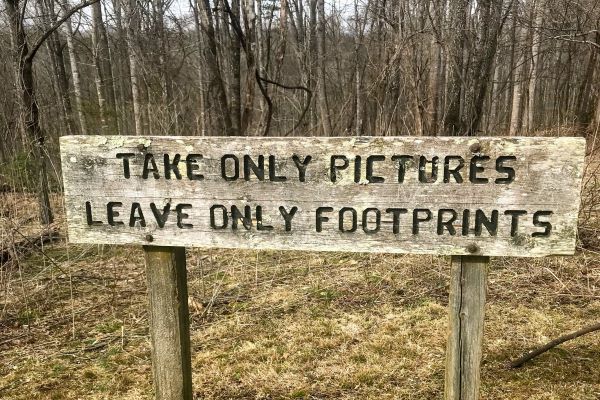“You cannot get through a single day without having an impact on the world around you. What you do makes a difference, and you have to decide what kind of difference you want to make.” – Jane Goodall
Have you felt overwhelmed by the enormity of climate change and how it is affecting our planet? We are inundated with dire reports of how humans are responsible for burning up the earth. It is easy to suffer paralysis of action even as we see millions of acres of forest burn down, entire ecosystems destroyed, plastic pollution killing marine life and natural resources becoming more scarce.
Is there anything we can do as an individual to help? Let’s not forget that all movements start with an individual—that obstinate person who refuses to give up or compromise, come what may—and blossom from there. Greta Thunberg comes to mind. Not long ago, she was an unknown Swedish schoolgirl. She refused to attend classes, insisting that climate change was more important to her than sitting in a classroom. Today, at 17, she is a global influencer on climate change, meeting with world leaders and inspiring millions to follow her. If she can, you can. By adopting small actions consistently, you can reduce your carbon footprint and help the world become a better place. Here are some easy ways to get started.
Walk more. No brainer. Walk a few blocks to your pharmacy or to meet your friend who lives down the block instead jumping into your car. Walking is enjoyable and contributes to a sense of well-being. You get to move your body and feel better instead of sitting in front of a steering wheel inside a mechanized box, also called a car. It also reduces air pollution.
Use public transport or bike. Can you use public transport or a car pool to get to work instead of driving to work? Does biking work better for you? Every car off the road makes a difference and reduces greenhouse gases contributing to climate change.
Avoid food waste. Did you know that around 1.3 billion tonnes of food—that’s about one third of the food produced in the world for human consumption—goes waste every year? Whenever food is trashed, it ends up in a landfill where it rots and produces methane which is far more toxic than carbon oxide.
Responsible shopping goes a long way in reducing food waste. Buy what you need and will eat. Otherwise, buy frozen food that won’t spoil and can be used later. Take your own shopping bags every time you shop for groceries (I always have one in my backpack). If there is a community garden in your vicinity, you can meet new people and work together to grow your own produce. Excess produce is donated to those who need it, so community gardens are a great way to get more involved in your community and reduce food waste. .
Make your home more energy-efficient. Switch all your bulbs to compact fluorescent bulbs (CFLs) which use 70% less energy than traditional bulbs and last many years longer. When shopping for electric or electronic products, check how energy-efficient it is. Usually, a label on the product will indicate this.
Reuse, recycle, upcycle. If you have something in good condition but don’t need it anymore, it might be a good idea to have a Swap Party or let your friends know you have an awesome item to give away. Posting items online is another way to get rid of what you don’t need and help someone who does.
Use less water. Do you run the water while brushing your teeth, even when you don’t need it? Or stay in the shower well after you are clean? Turning off the water while you brush your teeth and taking shorter showers will help conserve water, our most precious natural resource. Every drop counts.
Avoid fast fashion and beauty. Mass clothing and beauty produced to satisfy consumer thirst for the latest trends are major environmental polluters. Fast fashion is not made to last. Plastic packaging and chemicals from fast beauty chokes the earth and our oceans, destroying entire ecosystems.
Slow fashion might be a better way to go. Buying high-quality, timeless clothes and accessories will keep you looking good, regardless of the trend. Besides, you’ll spend less and save more in the long run. Buying second-hand is also a great option to reduce landfill waste and pollution. The same rule applies to beauty: buy good-quality products that you love and will use, rather than buying trendy items that will lie in some forgotten corner and be discarded.
Take your own cup to the coffee shop. Coffee lovers of the world, unite! Bring your own coffee cup every time you visit your favorite coffee shop. You can choose a plastic one if you’d like, but make sure to use it until you’re ready to hand over that plastic heirloom to your heirs for their use. The typical disposable coffee cup is hard to recycle. They are lined with plastic to ensure your coffee remains nice and hot on your way to work (or on any bad day, actually.) A fully environment-friendly alternative is not available yet, although the search is on.
We do not inherit the earth from our ancestors, we borrow it from our children. – Native American Proverb


Comments (5)
Excellent write-up. You have given some simple and practical solutions to contribute towards environmental well-being.
Me and close friends bn colleagues are also planning to start a WA group of our friends circle where we will post pics of our sarees n party wear dresses and will be sharing among us.
Keep sharing such useful informative and solution oriented write-ups.
Thanks, Hema! I’ll continue sharing . Look forward to seeing pics of you all in your best!
Live today to the fullest
Yes, so true, and we need to keep reminding ourselves of this.
Yesterday, today and tomorrow are the phases of life